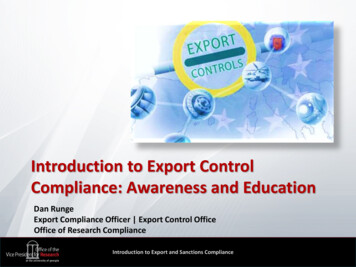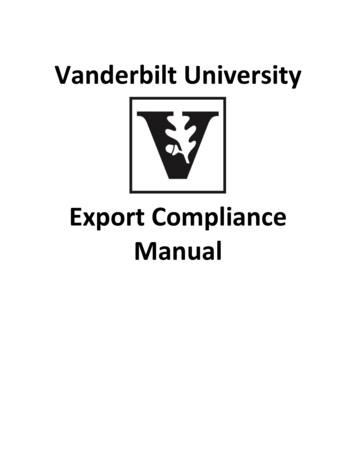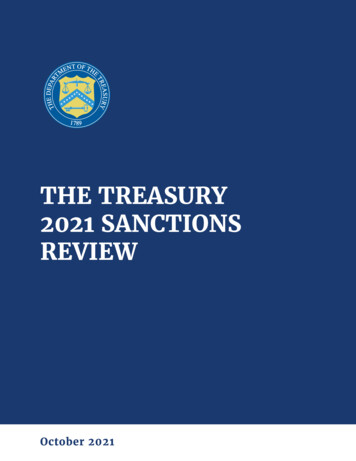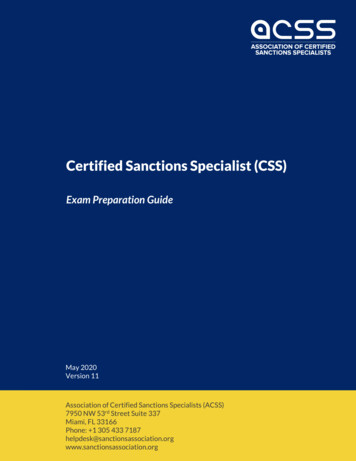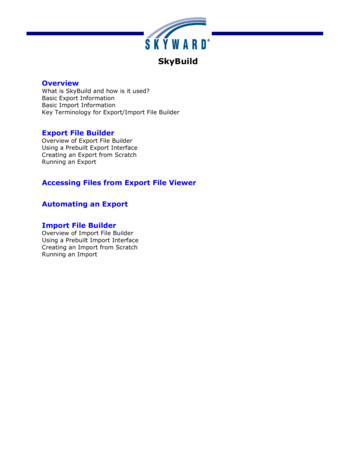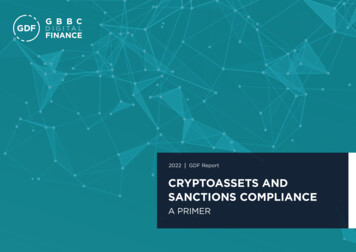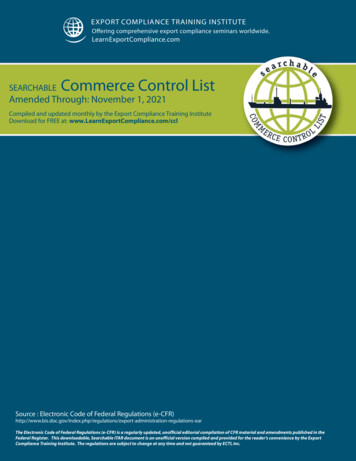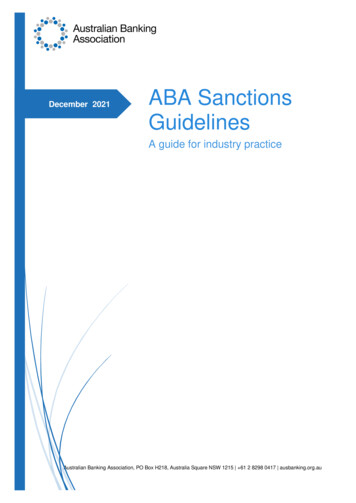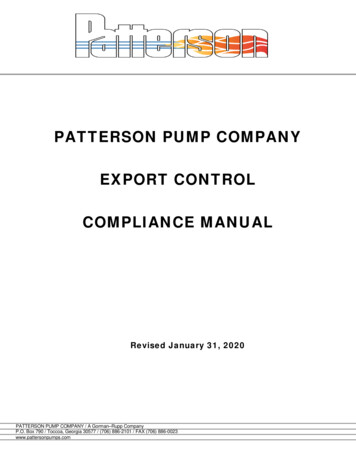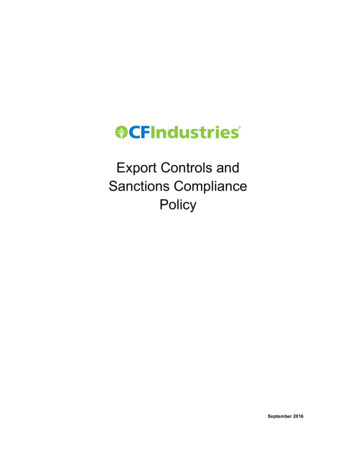
Transcription
Export Controls andSanctions CompliancePolicySeptember 2016
Table of ContentsI.Introduction . 1II.Sanctions Compliance Policy . 1III.Export Controls Policy . 7IV. Anti-boycott Policy . 8V. Risk-based Approach. 9VI. Record Retention . 10VII. Compliance Officer . 10VIII. Duty to Cooperate . 10IX. Training . 11X. Independent Review . 11XI. Who to Contact with Questions. 11XII. Reporting Procedures . 11
Export Controls and SanctionsCompliance PolicyI.IntroductionThe policy and commitment of CF Industries Holdings, Inc. and its subsidiaries (collectively,“CF Industries” or the “Company”) has been and continues to be that all employees, officers,directors and agents of the Company must comply fully with all applicable laws andregulations governing economic sanctions and export controls. These include the laws andregulations administered by the U.S. Department of the Treasury’s Office of Foreign AssetsControl (“OFAC”), the U.S. Department of Commerce’s Bureau of Industry and Security andCensus Bureau, the United Kingdom Export Control Organisation, the United KingdomOffice of Financial Sanctions Implementation, the Canadian Trade Controls Bureau, theCanadian Minister of Foreign Affairs, as well as similar laws and regulations in otherjurisdictions. These laws and regulations are the primary requirements that affect CFIndustries’ exports. However, certain other government agencies maintain exportrequirements that may also affect CF Industries.You are required to carefully review and adhere to this Export Controls and SanctionsCompliance Policy (the “Compliance Policy”). If you become aware of any violations of thisCompliance Policy, you must report such violations in accordance with the reportingprocedures outlined in Section XII below.II.Sanctions Compliance PolicyCF Industries is committed to adhering to the economic sanctions laws and regulationsadministered by OFAC ( “OFAC Laws”) and the economic sanctions laws and regulationsthat apply to our operations in the other countries where we do business (collectively, withOFAC Laws, “Sanctions Laws”). While there are some similarities among countries withrespect to Sanctions Laws, each country has different laws, regulations, and policiesadministered by different government agencies. This Sanctions Compliance Policy(“Sanctions Compliance Policy”) is intended to facilitate the Company’s compliance withSanctions Laws and to reduce reputational, operational, and legal risks that could arise froma potential breach of the Sanctions Laws.Background on U.S. Economic Sanctions Administered by OFACThis section provides an overview of the current OFAC Laws. It is NOT intended to provideguidance on whether any specific activity or transaction is permitted under applicable lawsand regulations. All services provided and all transactions conducted by or through the
Company must comply with all OFAC Laws. If there is a question concerning theserequirements or if you have been asked to do something which conflicts with theserequirements, you should promptly contact a Compliance Officer and/or the GeneralCounsel.OFAC administers economic sanctions against targeted non‐U.S. countries, organizations,and individuals. OFAC Laws related to its sanctions programs can be found in a series ofPresidential executive orders, statutes, and regulations. Sanctions, or restrictions, areimposed based on U.S. foreign policy and national security concerns. Many of the sanctionsare based on United Nations and other international mandates. The OFAC Laws can involveprohibiting unlicensed trade, blocking assets, prohibiting certain types of unlicensedcommercial and financial transactions, or a combination of these measures. The OFAC Lawsdiscussed below have significant civil and criminal penalties and are vigorously enforced.The laws and regulations administered and enforced by OFAC prohibit or restrict “U.S.Persons” (as defined below) from engaging in or facilitating transactions involving specifiedcountries, organizations, and individuals, which are listed on OFAC’s List of SpeciallyDesignated Nationals (“SDN”) and Blocked Persons (“SDN List”), the Executive Order 13599List (“EO 13599 List”) or which are otherwise the target of the OFAC Laws.Countries and regions subject to broad comprehensive sanctions include the Crimea regionof the Ukraine, Cuba, Iran, North Korea, Sudan, and Syria. While there are differencesamong the regulations applicable to each country, as a general matter, OFAC Laws prohibitU.S. Persons, wherever located, from providing goods or services, including financialservices, to persons where the benefit of such services is received in any of these countries.Each of these sanctions includes licenses that permit certain types of transactions that aredetermined to be consistent with U.S. policy toward the applicable country. Any potential orexisting business, trade or transaction with any of these countries (including any localcitizens, institutions, organizations or groups) or involving goods or services received fromor delivered to any of these countries, should be brought to the immediate attention of aCompliance Officer or the General Counsel.The United States has recently eased sanctions related to Cuba and Iran. However, mostelements of the U.S. embargo against these countries remain in place and most transactionsinvolving these countries remain prohibited, unless licensed by OFAC.OFAC also administers more targeted sanctions against specified narcotics traffickers,terrorists, transnational criminal organizations, malicious cyber‐related activities andweapons proliferators, as well as individuals and entities associated with a broad range ofcountries and regimes—including Cote d’Ivoire, Iraq, the Democratic Republic of the Congo,Belarus, the Balkans, Burundi, Central African Republic, Lebanon, Liberia, Libya, Venezuela,Yemen, South Sudan, Sudan/Darfur, Somalia, and Zimbabwe—who are included on the SDNList. Entities that are owned or controlled by an SDN are also subject to OFAC sanctions,whether or not those entities appear on the SDN List. OFAC also maintains the EO 135992
List, which is a list of persons identified by OFAC as meeting the definition of the termGovernment of Iran or the term Iranian financial institution.Some transactions may be permitted under a particular sanctions program, but generally,all transactions with SDNs or persons on the EO 13599 List are prohibited and any propertyin which the SDN or person on the EO 13599 List has an interest must be blocked. If any CFIndustries director, officer, employee or agent encounters a transaction involving an SDN orperson on the EO 1399 List, a Compliance Officer or the General Counsel should becontacted.The United States maintains limited sanctions against persons in Russia’s financial, energyand defense and related materials sectors that appear on OFAC’s Sectoral SanctionsIdentification List (“SSI List”). The sanctions against these companies are much morelimited than the sanctions against persons on the SDN List and focus on dealings involvingthe debt and equity of these companies and the provision of goods and services to certainoil projects in Russia. Many transactions with SSI entities are still permitted, although aCompliance Officer or the General Counsel shall be consulted regarding transactions withcompanies on the SSI List.Implementing regulations for many of the OFAC sanctions programsare codified in Title 31 of the Code of Federal Regulations, and bothbasic guidelines and details on implementation are available on theOFAC website at http://www.treasury.gov/ofac/.Specific organizations and individuals who have been targeted under the various sanctionsprograms are listed on the SDN List and the EO 13599 List and the Consolidated ScreeningList, which are supplemental but not exclusive lists of persons and entities with which theU.S. Persons who are directors, officers, employees or agents of CF Industries may not deal.The SDN List and the EO 13599 List are accessible at the OFACwebsite. The Consolidated Screening List, which includes the SDNList and other U.S. government lists of sanctioned and prohibitedindividuals and entities, is available at n some instances, the OFAC Laws and regulations may require the rejection of a transactionor the blocking of assets involved in a transaction.The summary provided above is current as of the latest revision date of this CompliancePolicy. It is the responsibility of all directors, officers, employees and agents to keep up todate on changes and additions made to the OFAC Laws.3
Application of OFAC Prohibitions to U.S. Persons at CF IndustriesOFAC’s prohibitions apply to transactions involving the United States or conducted by anyU.S. Person, wherever located. U.S. Person means any United States citizen, wherever in theworld the person is located (including dual citizens), any permanent resident alien of theU.S. (wherever located), any person (natural or non‐natural) located in the U.S., and anyentity organized under the laws of a U.S. jurisdiction including its overseasbranches/divisions. OFAC prohibitions thus apply to any director, officer, employee oragent of CF Industries who is a U.S. Person. The regulations generally prohibit a U.S. Personfrom “approving,” “facilitating,” participating in, financing or guaranteeing a transactioninvolving a person or entity on the SDN List, the EO 13599 List or who is otherwise thetarget of the OFAC Laws and regulations and from taking any action to evade or avoid OFACLaws.With respect to U.S. sanctions involving Cuba and in certain cases, Iran, the term “U.S.Person” also means any foreign subsidiary or affiliate owned or controlled by a U.S. Person.The Cuba and in certain cases, Iran sanctions programs apply not only to CF Industries as anentity, but also to any foreign subsidiaries of or entities controlled by CF Industries,wherever in the world they are located. Thus, under the Cuba and (in certain cases) Iransanctions programs, CF Industries’ non‐U.S. subsidiaries and other non‐U.S. entitiescontrolled by CF Industries, and not just its U.S. directors, officers, employees and agents,would be considered U.S. Persons.CF Industries’ OFAC Policy prohibits U.S. Persons at CF Industries from entering intobusiness relationships on behalf of CF Industries with any OFAC‐sanctioned party, or anyparty owned or controlled by or acting on behalf of any OFAC‐sanctioned party, andrequires directors, officers, employees and agents to report the attempted transaction to aCompliance Officer and/or the General Counsel.CF Industries shall ensure that customer screening and customer due diligence proceduresare in place to promote the identification of potential sanctions violations or otherpotentially impermissible transactions. Such procedures shall also provide for appropriatedistributor screening and distributor due diligence to ensure CF Industries' distributorscomply with Sanctions laws applicable to the Company.Recusal by an Employee Who is a U.S. PersonIf a director, officer, employee or agent of CF Industries who is a U.S. Person, including anyCF Industries director, officer, employee or agent who is in the United States temporarily,finds that he or she has been assigned to work on a transaction or business matter that hasbeen identified as potentially involving OFAC sanctions, that director, officer, employee oragent must immediately recuse himself/herself from dealing with the transaction orbusiness matter. The U.S. Person must also immediately inform his or her supervisor, aswell as a Compliance Officer and/or the General Counsel of such recusal.4
Background on EU SanctionsThis section provides an overview of current EU sanctions regulations. It is NOT intended toprovide guidance on whether any specific activity or transaction is permitted underapplicable laws and regulations. All services provided and all transactions conducted by orthrough the Company must comply with applicable EU sanctions regulations. If there is aquestion concerning these requirements or if you have been asked to do something whichconflicts with these requirements, you should promptly contact a Compliance Officerand/or the General Counsel.Although the jurisdictional reach of EU sanctions regulations can vary depending on thetargets, there are several common themes: EU organized entities must comply with EU sanctions. Other countries outside of the EU also often follow EU sanctions such asSwitzerland, Norway or UK protectorates or dependencies. EU citizens are subject to EU laws, even if they are living or working outside of theEU. Activities in, or partially in, the EU are covered. Any non‐EU entity or person issubject to EU Sanctions Laws while they are acting within the territory of the EU. The EU devolves enforcement of sanctions to competent authorities of each EUMember State, such as HM Treasury and the Office of Financial SanctionsImplementation in the United Kingdom.EU sanctions can take different forms, but the most common measures are asset freezes("EU Financial Sanctions"), and arms embargoes, general or specific sectoral trade or exportembargoes ("EU Economic Sanctions", collectively with EU Financial Sanctions, "EUSanctions"). EU sanctions apply to: (i) any person within the territory of the EU; (ii) anyperson inside or outside the territory of the EU who is a national of an EU Member State;(iii) any legal person, entity or body, inside or outside the territory of the EU, which isincorporated or constituted under the law of an EU Member State; (iv) any legal person,entity or body in respect of any business done in whole or in part within the EU; and (v) anyperson on board any aircraft or any vessel under the jurisdiction of an EU Member State(collectively, “EU Persons”).EU Financial Sanctions are imposed on persons or entities (so called "designated persons")listed on the EU's Consolidated List of Persons, Groups and Entities (“EU Consolidated Listof Persons”).EU Financial Sanctions include measures against government or ex‐government officialsand others suspected of human rights abuses, violations of public international law, internal5
repression or political instability, theft of state assets or funds, war crimes or assassination,terrorism and terrorist financing, being a member of Al Qaida, and assisting in nuclearproliferation. EU Financial Sanctions also target persons profiting from any such violations,crimes or abuses.EU Financial Sanctions apply to conduct in and from the EU and generally also apply to EUcitizens and companies outside EU territory. It is a criminal offense to breach an EUFinancial Sanction, without an appropriate license or authorization.Although each sanctions regime is implemented by each EU Member State individually, itcan constitute a criminal offense for an EU national or company anywhere in the world to:(i) deal with the funds or economic resources belonging to or owned, held or controlled by adesignated person; (ii) make funds or economic resources available, directly or indirectly,to, or for the benefit of a designated person; (iii) intentionally circumvent financialsanctions; or (iv) fail to notify the regulator of possession of funds owned or controlled by adesignated person. The definition of “funds” is broadly construed to include cash, all kindsof payment instruments, deposits, shares, derivatives, interest, guarantees, letters of creditand rights of set‐off.The EU Consolidated List of Persons is accessible on the EU websiteat /index en.htm.EU Economic Sanctions include embargoes with respect to certain products and servicesexported to a particular country. Where it is not prohibited to import or export goods, theparticular good or destination or use may be restricted and subject to licensing. It canconstitute a criminal offense to import or export goods without the required license.EU Economic Sanctions are imposed on a country and typically involve prohibiting orrestricting trade, prohibiting or restricting certain types of commercial and financialtransactions with natural or legal persons in the respective country or other appropriatemeasures. Prohibitions or restrictions will apply in relation to goods and services which canbe used for military purposes, internal repression or nuclear proliferation, for example,exporting or supplying arms or dual use products and associated technical assistance,training and financing or technologies. Sectoral EU Economic Sanctions include restrictionsor prohibitions in various sectors including: oil and gas, financial services, access to capitalmarkets, luxury goods, certain computer software and technologies.The summary provided above is current as of the latest revision date of this CompliancePolicy. It is the responsibility of all directors, officers, employees and agents to keep up todate on changes and additions made to the EU Sanctions.PenaltiesViolations of the Sanctions Laws carry significant civil and criminal penalties. For violationsof the OFAC Laws, criminal penalties can include fines of up to 1,000,000 per violation and6
imprisonment for up to 20 years. Civil penalties for violations of the OFAC Laws can includefines of 250,000 per violation or twice the amount of the transaction that is the basis of theviolation, whichever is greater.The consequences of a failure to abide by EU Sanctions can be similarly severe. Although,each Member State’s penalties vary, violations of EU Sanctions may lead to prosecution byEU Member States and result in serious criminal and administrative penalties for theCompany and associated individuals.III.Export Controls PolicyThe United States administers controls over the export, reexport, and transfer of goods,technology, and software for national security, foreign policy, nuclear non‐proliferation, andother policy reasons. The U.S. Department of Commerce, Bureau of Industry and Security(“BIS”), has jurisdiction over most (but not all) such exports, re‐exports, and transfers.Among other things, BIS controls goods and information having both civilian and militaryuses by including them on the Commerce Control List, 15 CFR Part 774. A license from BIS(and/or another U.S. agency), may be required prior to engaging in exports, re‐exports, ortransfers involving a prohibited end use, end destination, or end user. Prohibited end usersinclude individuals and entities listed on various lists maintained by BIS, such as the EntityList (15 CFR Part 744, Supplement No. 4), and other U.S. government lists. Among the mostrestrictive end destinations are Cuba, Iran, North Korea, Sudan, and Syria. Prohibited enduses include (but are not limited to) terrorist‐related end uses, the development,production, or use of rocket and missile systems, and weapons of mass destruction.It is the policy of CF Industries to comply with all U.S. export control laws. In any case wherean employee is uncertain as to its applicability to a particular matter, the employee shouldcontact the Company’s Compliance Officer or General Counsel to enable a furtherdetermination of the applicability of U.S. export controls.The U.S. Department of Commerce maintains a public websitesummarizing the BIS export controls .htm.Penalties for violations of U.S. export controls are substantially the same as for violations ofthe OFAC Laws. The criminal penalties for each willful violation can be a fine of up to 1,000,000 and imprisonment for up to twenty years. Administrative penalties may also beimposed which may include denial of export privileges, and the imposition of fines of 250,000 per violation or twice the amount of the transaction that is the basis of theviolation, whichever is greater.7
IV. Anti-boycott PolicyDuring the mid‐1970’s the United States adopted two laws that seek to discourage theparticipation of U.S. citizens in other nations’ economic boycotts or embargoes that havebeen found to be contrary to U.S. foreign policy. These anti‐boycott laws are the 1977amendments to the Export Administration Act (“EAA”) and the Ribicoff Amendment to the1976 Tax Reform Act (“TRA”). It is the policy of CF Industries to comply with the U.S. anti‐boycott laws with respect to all operations that are subject to U.S. jurisdiction. Othercountries in which CF Industries does business may have similar laws. You should consultwith the Compliance Officer(s) regarding questions about whether the U.S. or otherjurisdictions’ laws apply to a transaction.The Arab League boycott of Israel is the principal foreign economic boycott encountered byU.S. companies. The anti‐boycott laws, however, apply to all boycotts imposed by foreigncountries that are not authorized by the United States.The anti‐boycott provisions of the EAA, which are administered by BIS, apply to U.S. personswherever located. A “U.S. person” is defined as any person who is a U.S. resident ornational, including individuals, domestic concerns such as companies and associations, andcontrolled‐in‐fact foreign subsidiaries, affiliates, or other permanent foreign establishmentsof domestic concerns. A U.S. person’s activities in the interstate or foreign commerce of theUnited States are subject to the prohibitions of the EAA. Such activities include those thatrelate to the sale, purchase, or transfer of goods or services (including information)between U.S. states, territories, or possessions or between the United States and a foreigncountry. Thus, the EAA covers U.S. exports and imports, financing, forwarding and shipping,and certain other transactions that may take place wholly offshore, including activities ofcontrolled‐in‐fact foreign affiliates of a U.S. person relating to interstate and foreigncommerce of the United States.The U.S. Department of Commerce maintains a public websitesummarizing the anti‐boycott requirements The TRA, which is administered by the Treasury Department, applies to all U.S. taxpayersand their related companies as well as U.S. shareholders of foreign companies. The TRA’sreporting requirements apply to taxpayers’ operations in, with, or related to boycottingcountries or their nationals.Conduct that may be penalized under the TRA and prohibited under the EAA includes: participating (or agreeing to participate) in a boycott that is not sanctioned by theU.S. government;refusing (or agreeing to refuse) to do business with or in Israel or with blacklistedcompanies;8
discriminating (or agreeing to discriminate) against other persons based on race,religion, sex, national origin, or national identity;providing (or agreeing to provide) information about business relationships with orin Israel or with blacklisted companies;providing (or agreeing to provide) information about the race, religion, sex, ornational origin of another person;implementing letters of credit containing prohibited boycott terms or conditions;andfailing to report any of the above.The EAA requires U.S. Persons to report on a quarterly basis to BIS any requests they havereceived to take certain actions to comply with, further, or support an unsanctioned foreignboycott. The TRA requires taxpayers to annually report to the Treasury Departmentoperations in, with, or related to a boycotting country or its nationals and requests receivedto participate in or cooperate with an international boycott. The Treasury Departmentpublishes a quarterly list of boycotting countries.The criminal and civil penalties for violating the antiboycott provisions of the EAA are thesame as those described above for export control violations. Pursuant to the TRA,violations can result in the denial of the foreign tax credit, foreign subsidiary deferralbenefits, and other tax benefits under U.S. law.It is the policy of CF Industries to fully comply with U.S. anti‐boycott laws and to refuse toparticipate in or agree to participate in any unsanctioned foreign boycott. If a CF Industriesdirector, officer, employee, or agent receives a request to take any action to comply with,participate in, or support an unsanctioned foreign boycott, he or she should immediatelyadvise the Compliance Officer(s) and General Counsel to enable a determination of whethera report by CF Industries is required. The Compliance Officer(s) will, as necessary, submitreports required by the EAA and TRA to BIS and the Treasury Department.V. Risk-based ApproachCF Industries will utilize a risk‐based approach to implement this Compliance Policy. TheCompliance Policy implementation will be based on an overall assessment of the Company’sexposure to risks and will take into account factors such as (i) its customer base; (ii) theamount of direct contact with customers; (iii) the regions in which it operates (in particular,any international offices or agents); (iv) the types of products and services that it offers,including those deemed to present higher risk based on regulatory guidance; and (v) thevolume of large currency transactions. The “level of risk” assessment will be updatedperiodically to address potential changes in CF Industries’ risk profile, such as an expansionof activities or the introduction of new products and services.9
VI. Record RetentionCF Industries will comply with the retention requirements for all records compiled andmaintained in accordance with the Sanctions Laws and export control laws. All documentsrequired to be maintained under U.S. OFAC Laws and export control laws must bemaintained for a minimum of five (5) years. Other jurisdictions may impose longer recordsretention periods.VII. Compliance OfficerThe Company’s Compliance Officer(s) will be responsible for overseeing the coordinationand monitoring of this Compliance Policy. The Compliance Officer(s) will be responsible foroverseeing all aspects of the Company’s adherence to applicable Sanctions Laws and exportcontrol laws and implementing regulations, including: providing guidance to management and the different departments within CFIndustries on economic sanctions and export control compliance matters;monitoring legal and regulatory developments and best practices in the economicsanctions and export control area;recommending changes to the Compliance Policy based on such developments;responding to inquiries regarding economic sanctions and export control matters;andproviding for economic sanctions and export control training.Other responsibilities of the Compliance Officer(s) include: (i) carrying out the direction ofthe Board with respect to economic sanctions and export control matters; and(ii) coordinating with the Company’s human resources department to communicate updatesto the Compliance Policy.VIII. Duty to CooperateCF Industries may at any time undertake formal or informal audits, investigations, orinquiries concerning compliance with this Compliance Policy and related procedures. CFIndustries expects and requires that all CF Industries directors, officers, employees andagents will fully cooperate with the Company, outside counsel, outside auditors, or othersimilar parties in all such audits, investigations, and inquiries. Failure to cooperateconstitutes a breach of this Compliance Policy and, in addition to other applicable legalobligations, may result in termination, cancelation of contracts, or other appropriate action.10
IX. TrainingTo promote awareness of CF Industries’ obligations under the Sanctions Laws and exportcontrols laws, and to help employees understand their roles and responsibilities under thisCompliance Policy, CF Industries will provide periodic training. All designated employeesare required to participate in and complete the Company’s general sanctions and exportcontrols training program. New hires will receive training during orientation asappropriate. CF Industries will maintain records of training materials and attendance attraining sessions.X. Independent ReviewThe Company’s compliance department is responsible for ensuring that an independentreview of this Compliance Policy and independent testing of quality assurance areconducted. These internal audits must take place at least annually. In performing thisreview and testing, CF Industries is committed to addressing adequately its systems andcontrols for complying with Sanctions Laws and export controls laws and regulations andshall, at a minimum: (i) perform transaction testing designed to ensure reasonably that theinstitution is following Sanctions Laws and export controls laws; (ii) review processes toassess knowledge of regulations and procedures; (iii) review written procedures andtraining programs for completeness and accuracy; and (iv) report findings to theCompliance Officers. The Com
You are required to carefully review and adhere to this Export Controls and Sanctions Compliance Policy (the "Compliance Policy"). If you become aware of any violations of this Compliance Policy, you must report such violations in accordance with the reporting procedures outlined in Section XII below. II. Sanctions Compliance Policy
